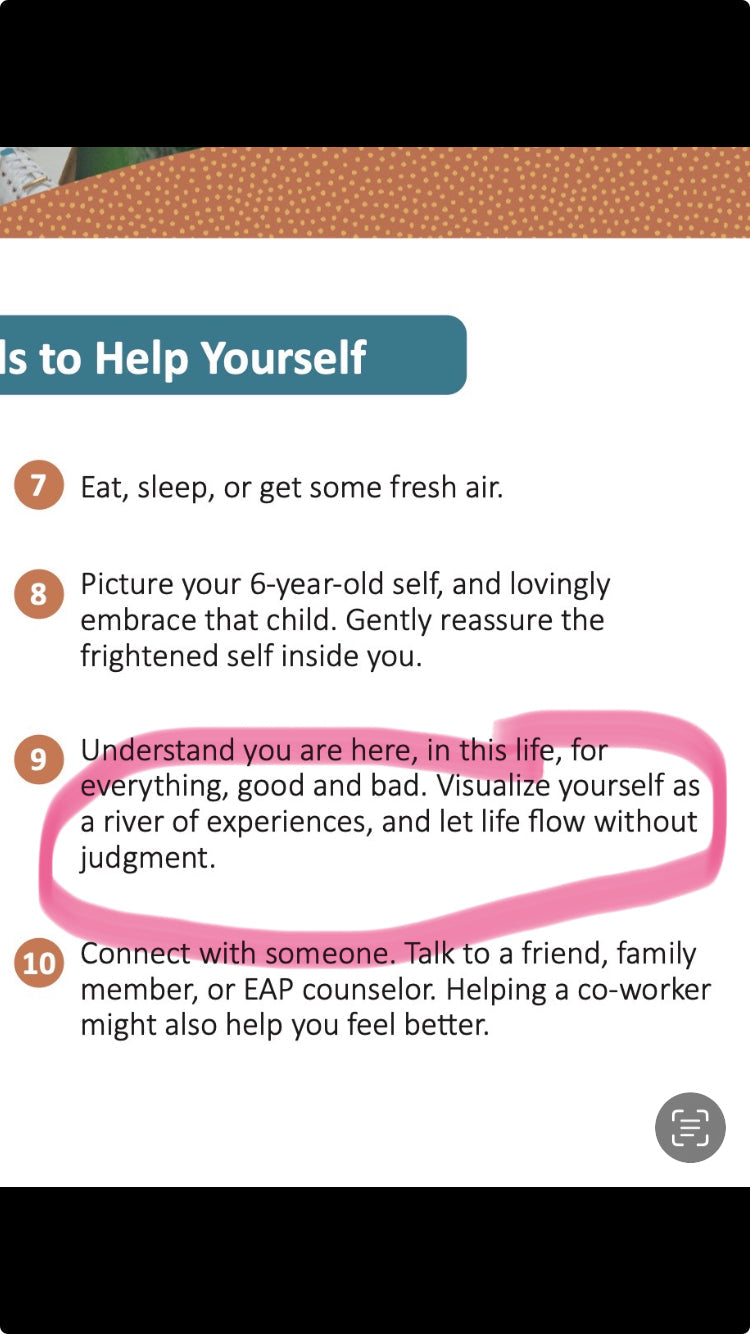
Visualize Yourself as a River of Experiences
Share
Why I Want my Work to Stop Caring About my “Mental Health”
Last week I got an email from the community college where I work, explaining that there had been a massive data breach with the third party organization, called Carruth, that manages employee retirement plans. The college had given Carruth access to all of our personal information (even if we didn’t have a retirement plan)--names, social security numbers, dates of birth, pay and retirement account information–and all of that information had been compromised. “Unfortunately,” the email stated, they wouldn’t be “individually notifying impacted employees.” In other words, we should just assume we were impacted and act accordingly. It went on to “encourage” us to take the following proactive steps: enroll in credit monitoring, monitor financial accounts, set up fraud alerts, freeze your credit. And that’s where the email should have ended. But it didn’t.
Instead, the email went on to promote the school’s Employee Assistance Services (EAPs, because these people love acronyms) to “support you in the event that you or one of your employees is the victim of identity theft.” The list included a link to another list (very helpful), a link to free crisis counseling, and a link to something called “emotional first aid for employees.”
I am a hater, and I already felt insulted by this list, so I clicked on the emotional first aid link. This picture appeared at the top and I knew we were in trouble.
Why does it look like this guy is accepting Jesus as his lord and savior? My friend also pointed out that this a white man being comforted mostly by women. Cool cool cool.
But I digress. The page listed “emotional first aid” tips like “encourage positive self-talk” and “encourage mindfulness strategies you find helpful.” I tried to imagine encouraging positive self-talk to my coworkers right now, as they sit on hold to enroll in credit monitoring and go through the steps to freeze their credit. Hmmm. I kept scrolling. At the end I found “10 emotional first aid skills to help yourself.” Everything on the list sounded like either something they’d make you say in the break room on Severance or it was so absurdly obvious that it felt insulting. “Eat, sleep,” seriously?
Here are my favorites (also pictured above):
-
Picture your 6-year-old self, and lovingly embrace that child. Gently reassure the frightened self inside you.
-
Understand you are here, in this life, for everything, good and bad. Visualize yourself as a river of experiences, and let life flow without judgment.
I just learned that all of my personal information may have been leaked in a massive data breach, and my employer is telling me to visualize. myself. as. a. river. of. experiences? How did we get here?
Something about the movement towards workplaces “caring” about “mental health” has never sat well with me. Aside from providing me with benefits that can aid me in taking care of all areas of my health, I don’t want my workplace to have any involvement with my mental health. For one thing, as demonstrated above, the advice and resources are never good. That’s because there is no “general” mental health advice. I know that’s probably a very unpopular thing to say in the era of mental health influencers and self-help and #wellness, but hear me out. I mean, sure, there are some things that are probably generally healthy for your mental wellbeing no matter who you are. I don’t know: routine? friendship? talking about your feelings? But I’d like to think that therapists exist precisely because there is no general mental health advice that applies to everyone. We’re all different and need different things. But even if there is universal mental health advice (and I’m not sure that there is), do I want to receive it from my employer in a data breach notification email from the (warmly personal) email address internal-comms-group?
In the same way that most people are probably more irritated than motivated by workplace initiatives to get them to stop smoking, or lose weight, or exercise more, I am irritated by my employer doling out empty mental health rhetoric and “resources,” especially in the face of a distressing situation that is their fault. Don’t say “whoops, we might have allowed someone to steal all your personal information. If that stresses you out, try imagining yourself as a river experiences.” It’s just kind of disrespectful.
But this oversimplification of “mental health” is part of a larger trend towards the mainstreaming of therapy speak, DSM diagnoses, and complex psychological topics, and I’m not even sure if I know what we mean anymore when we say “mental health.” Am I having a “mental health” crisis and in need of first aid if I’m (rightfully) distressed or angry over my information being included in a data breach? Surely not anymore than someone who catches a cold is having a physical health crisis and in need of first aid. Unless, of course, they have pre-existing conditions that make a distressing situation or a virus deadly or dangerous to them. And in that case, generalized mental or physical health advice might not be that useful–like telling someone with a physical disability to “take the stairs” or someone with an anxiety disorder to “accept all your feelings” (one of the items on the mental health first aid list). In fact, that kind of generalized advice might be harmful in these situations.
When managers and administrators offer mental health platitudes in place of giving us actual information or full benefits that cover real mental healthcare, they are putting the responsibility back on us to use the “tool kit“ to deal with our “mental health” (or as some might call it our normal distressed response in the face of uncertainty). This faux concern for mental health that’s directed at employees might just serve as another tool to silence justified emotional responses to workplace injustices, stress, and uncertainty. I don’t need breathing exercises and mantras. I need reassurance that my workplace will make changes so that it doesn’t compromise 4,000+ employees’ private data again.
I have worked in academia for 13 years and have very little other work experience, so I don’t know if the workplace mental health trend has made its way into other sectors. But I know that academia has a history of talking out of both sides of its mouth when it comes to how they present their mission to the public and how they treat their employees. (I’ve written about this here and here.) Virtue signaling and social justice language pervade every email, memo, and strategic plan, yet faculty constantly have to fight for cost of living adjustments, job security, and even basic campus amenities. (It took an institution-wide email petition to get the administration to address the fact that several campuses didn’t have reliable wi-fi for almost two years after the pandemic.) Maybe the absurdist pairing of a data breach announcement with personal mental health advice would seem less nefarious if the school had a better track record.
After receiving the data breach email, I enrolled in credit monitoring and I’ve been keeping a close eye on all of my accounts. So far, my personal information is safe. I screen shotted the “river of experience” list and sent it to a few friends and coworkers, and everyone has had a good laugh. It has the making of a long running inside joke. To be fair, the EAP links did include some useful services, but they also included a lot of empty rhetoric and vaguely insulting advice, given the context. And I was left feeling not grateful, but suspicious of the coupling of bad news with wellness platitudes and the implication that all of this was my problem now. In other words, I was not prepared to let the river of experiences flow without judgement. I’m still not.


1 comment
Is it bad that everything you post about your job makes me want to scream into a pillow? (Is screaming into a pillow one of the approved coping skills?)
Like… I work in mental health and this is so bad/funny/bizarre to me. Not all emotions need to be pathologized! You do not need to visualize yourself as a river of experiences as a response to having all your data compromised!
Visualize yourself as a river of experiences. I cannot.